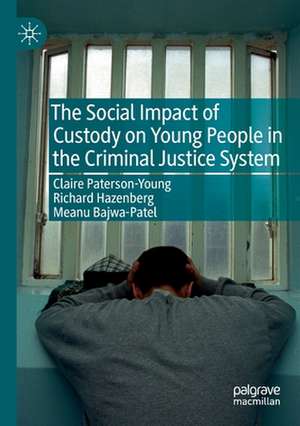The Social Impact of Custody on Young People in the Criminal Justice System
Autor Claire Paterson-Young, Richard Hazenberg, Meanu Bajwa-Patelen Limba Engleză Paperback – 14 aug 2020
| Toate formatele și edițiile | Preț | Express |
|---|---|---|
| Paperback (1) | 448.97 lei 6-8 săpt. | |
| Springer International Publishing – 14 aug 2020 | 448.97 lei 6-8 săpt. | |
| Hardback (1) | 527.97 lei 6-8 săpt. | |
| Springer International Publishing – 18 iul 2019 | 527.97 lei 6-8 săpt. |
Preț: 448.97 lei
Nou
Puncte Express: 673
Preț estimativ în valută:
85.92€ • 93.30$ • 72.17£
85.92€ • 93.30$ • 72.17£
Carte tipărită la comandă
Livrare economică 22 aprilie-06 mai
Preluare comenzi: 021 569.72.76
Specificații
ISBN-13: 9783030184247
ISBN-10: 3030184242
Pagini: 219
Ilustrații: XV, 219 p. 8 illus.
Dimensiuni: 148 x 210 mm
Greutate: 0.29 kg
Ediția:1st ed. 2019
Editura: Springer International Publishing
Colecția Palgrave Macmillan
Locul publicării:Cham, Switzerland
ISBN-10: 3030184242
Pagini: 219
Ilustrații: XV, 219 p. 8 illus.
Dimensiuni: 148 x 210 mm
Greutate: 0.29 kg
Ediția:1st ed. 2019
Editura: Springer International Publishing
Colecția Palgrave Macmillan
Locul publicării:Cham, Switzerland
Cuprins
1. Introduction.- 2. Youth Justice: The Impact of Policy on Current Practice.- 3. Social impact measurement and Youth Justice.- 4. Health and Wellbeing.- 5. Relationships.- 6. Education.- 7. Independence and Attitudes.- 8. Rehabilitative Environment.- 9. The Future of Youth Justice Rehabilitation.
Notă biografică
Claire Paterson-Young is Senior Researcher at the Institute of Social Innovation and Impact at the University of Northampton, UK. Claire’s completed a large research project measuring the impact of secure accommodation on young people in the criminal justice system. She has significant experience working in youth and restorative justice, social impact and safeguarding.
Richard Hazenberg is Professor of Social Innovation at the Institute of Social Innovation and Impact at the University of Northampton, UK. Richard has managed several international and national research projects for the University including projects funded by the European Social Fund (ESF), Horizon 2020 (H2020) and Big Lottery Fund.
Meanu Bajwa-Patel is Senior Researcher at the Institute of Social Innovation and Impact at the University of Northampton, UK. Meanu has considerable experience of teaching students at secondary level and trainee teachers. Her research includes working with families of children with SEND, schools and disadvantaged young people and she has managed both national and European research projects.
Richard Hazenberg is Professor of Social Innovation at the Institute of Social Innovation and Impact at the University of Northampton, UK. Richard has managed several international and national research projects for the University including projects funded by the European Social Fund (ESF), Horizon 2020 (H2020) and Big Lottery Fund.
Meanu Bajwa-Patel is Senior Researcher at the Institute of Social Innovation and Impact at the University of Northampton, UK. Meanu has considerable experience of teaching students at secondary level and trainee teachers. Her research includes working with families of children with SEND, schools and disadvantaged young people and she has managed both national and European research projects.
Textul de pe ultima copertă
This book explores the journey of young people through a Secure Training Centre and, more generally, the criminal justice system in the UK. It examines the extent to which young people have been failed by the system at every stage of their lives, with incarceration used as a means of removing ‘the problem’ from society. To explore this process, the authors utilise an integrated theoretical framework to develop a new rehabilitative approach focused on developing positive outcomes for young people. The book deploys a social impact measurement methodology to evaluate the experience and outcomes of youth justice interventions at a Secure Training Centre. Such an approach provides a fresh perspective on the youth justice debate which has traditionally utilised outcome data to measure immediate impact relating to recidivism and is therefore not focused on the young person holistically. Using a social impact framework to evaluate youth justice, underpinned by an integrated theoretical framework, allows for assessment to be made which place the young person at the centre of evaluation.
Caracteristici
Uses an innovative Social Impact Model to assess the experience and outcomes of children in the youth justice system Builds on the emerging theme in youth justice to focus on the whole child and outcomes rather than processes Argues that that the youth justice system in the UK needs an overhaul that is centred around holistic approaches
